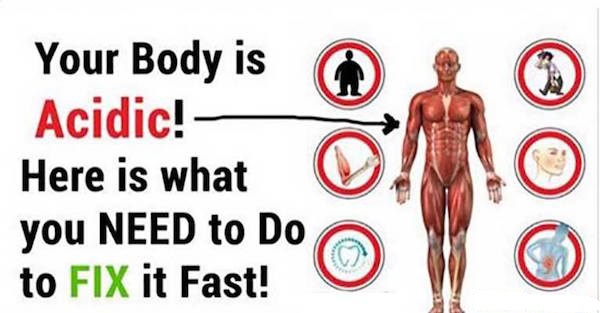Having an acidic diet can lead to many health problems, imbalances in the body and potential dangerous illness. Our bodies need to work at an optimal pH level to survive in a strong and healthy manner.
pH stands for Potential Hydrogen. It measures the concentration of hydrogen-ions in the body fluids. The pH scale ranges from 0 to 14. Body fluids with a high pH level are richer in oxygen and more alkaline. Lower pH levels are less oxygenated and more acidic. 7 is regarded as neutral pH
These are the ideal pH levels of the body fluids:
• Saliva pH = 7.0-7.5
• Blood pH = 7.35-7.45
• Urine pH = 4.6-8.0
When these are unbalanced, or too high, there are several health risks.
Problems caused by acidity
Set out below are some of the problems that can be caused by a body that is too acidic.
Obesity
If our bodies are too acidic they cannot get rid of the waste. The kidneys, colon, skin and lymph become overworked with the stream of toxins from the surplus acid and cannot get rid of it. The acid then gets sent to the fat tissues where it attaches itself to the fat cells.
Poor dental health
Our teeth and mouths feel the effect of an alkaline body.
If there is excess acid in a body, the body will try to alkalize itself to prevent illness. It does this to the detriment of our bones and our teeth. The body pulls calcium from our teeth, so while it may temporarily cure some problems, it causes new ones.
A poor diet, or one rich in sweet food and drinks, exasperates the production of lactic acid in the mouth. This causes cavities, the second dental problem of acidity.
And when our mouth feel the effects of acidity in the body, our gums and teeth become extra sensitive and especially painful when drinking hot or cold drinks. That is the third dental problem.
And then, cavities and bleeding gums are common.
Weak bones
In the same way the body tries to protect itself by taking calcium from teeth, the body does exactly the same with the bones. When there is too much acid the body will try keep it alkaline and will pull calcium from the bones and minerals from the organs and tissues to minimize and alkalize the acidity. Calcium is one of those minerals. When the body uses up the bones calcium reserves, the bones become weak.
This leads to osteoporosis or osteopenia and people can break or fracture bones easily. They should cut coffee, fizzy drinks, beef and any acidic foods from their diet.
Mucus build up
Your nasal passages can be affected with a high alkaline content. Your body will produce mucus to eliminate the acid build up. This extra mucus will start to affect your lungs and will cause coughing, sinus problems, wheezing, asthma, chest pains and breathing problems.
Acne / Skin problems
If the pH level in our body is wrong, the kidneys start struggling with the toxins. The skin also acts as a flushing out organ, but if overwhelmed with toxins, it cannot. Dermatological manifestations appear — pimples, acne, rashes, eczema and psoriasis. If there is too much acid in the blood then it becomes susceptible to bacteria and toxins. The skin usually flushes these out, but it cannot do that when there is too much acid.
Exhaustion
Our body needs fluids for daily and vital tasks, like digestion, transporting nutrients and oxygen throughout the body, protection and overall lubrication of the body. If our fluids become too acidic, then the capacity of our fluids to work becomes less. Our body has to work that much harder, resulting in fatigue.
Sleeplessness
This goes with exhaustion, but if there is too little calcium in your body then insomnia strikes. Your body cannot relax and settle with unbalanced pH levels and high acidity will cause sleeplessness.
Muscle and joint pain
Too much acid leads to constricted muscles which means the capillaries carrying blood and running through the muscles have to work extra hard. The body is deprived of oxygen. Vitamin and nutrients cannot be absorbed by the blood. The muscles work hard to function, extra chard, leading to muscle pain. If you have fatigue with the muscle pain this is a very clear sign that your body is overloaded with acids.
How to reduce acidity in your body
Stay hydrated. A well hydrated body allows excess acid to move through your system. The digestive tract can eliminate waste and toxins.
Drink warm lemon water. Lemon juice is only acidic outside the human body. Once it is in the body is undergoes metabolism and works as an alkaline, increasing the pH levels in your body.
Eat your greens. Green vegetables are high in alkaline. Cucumber, spinach, broccoli, chard, lettuce, celery and green asparagus are all good. Think about juicing some of these vegetables. It is why green juice is so healthy.
Cut acidic products out of your diet. This means cut down on or do not have any caffeine, alcohol, fizzy drinks, processed meats, junk foods and artificial sweeteners.
Add calcium and magnesium to your diets. Have these in capsule form or eat foods rich in them. They are good for your bones and teeth. Dark leafy green vegetables are good, as is seafood (salmon) dried fruits and grains.
Eat organic. Try and cut out all processed or genetically modified foods and eat organic only.
